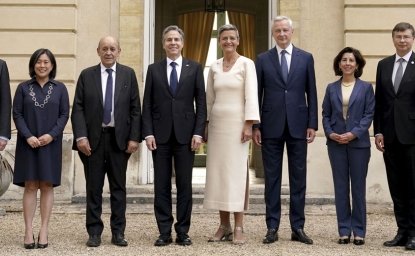Close collaboration with allies is vital if America is to succeed in today’s strategic competition with authoritarian rivals. We offer some examples in this three-part blog series relating to the December 5, 2022 United States – European Union Trade and Technology Council meeting.
The friction caused by territorial limits to eligibility for tax credits when purchasing an electric vehicle (EV) is creating significant friction among America’s most important allies. President Joe Biden’s expression of flexibility during the recent joint press conference with France’s President Emmanuel Macron is welcomed. It should be followed up with action on the unspecified “tweaks” to which he alluded.
The EU and other allies have long pressed America to take substantive action to address climate concerns. The $369 billion provided in the Inflation Reduction Act is responsive in that it includes significant subsides to producers of environmental goods—including electric vehicles. It is not without controversy in the United States. There is also significant international concern as to its domestic content requirements. Many fear that it precludes extending the law’s benefits to manufacturers in the European Europe (EU), Japan, and South Korea.
Some Americans question whether tax credits funded by its taxpayers should be applied to support export-oriented economies. The EU concern is not just about exports being disadvantaged on price, but also about the potential for businesses decamping to the United States to benefit from the tax incentives. The fact that energy costs in Europe are roughly five times that of the United States adds to the general unease of EU businesses. Many question whether such measures are compliant with the WTO. South Korea questions whether they represent a violation of their trade agreement with the United States.
It is vital that an understanding be reached. Even as America grants accommodations related to recently imposed restrictions on advanced semiconductor technology exports, it will need the close collaboration with all parties aggrieved by its electric vehicle tax credits for such restrictions to have their intended effect.
Further, the EU is expected to begin implementation of a cross-border carbon adjustment mechanism that some worry may include provisions favoring European firms, and could abridge WTO standards. Each side’s standing to challenge trade distortions is weakened when their own practices are drawn into question. In the context of the broader strategic competition with authoritarian nations, persistent fractures among allies can be fatal. A greater commitment to achieving mutual understanding is essential.
While taken off the agenda of the United States–European Union Trade and Technology Council meeting on December 5, 2022, it is essential that the approach to electric vehicle tax credits does not undermine the alliances critical to success in broader strategic competition.
Authors

Director of the Information and External Relations Division and Chief Spokesman at the World Trade Organization (retired)


Wahba Institute for Strategic Competition
The Wahba Institute for Strategic Competition works to shape conversations and inspire meaningful action to strengthen technology, trade, infrastructure, and energy as part of American economic and global leadership that benefits the nation and the world. Read more





